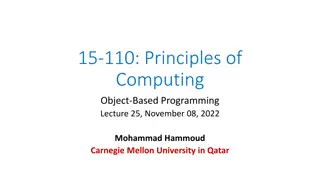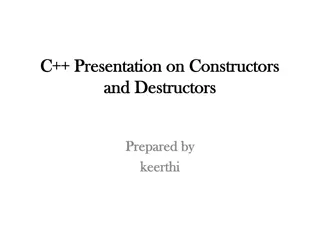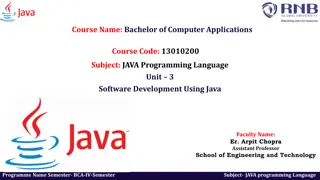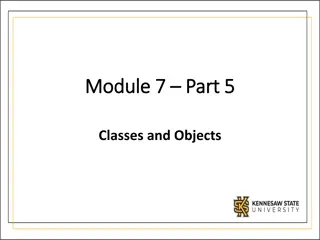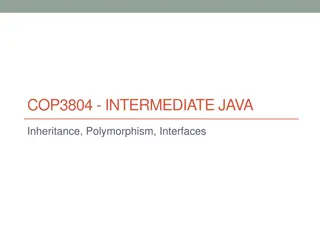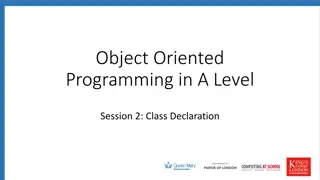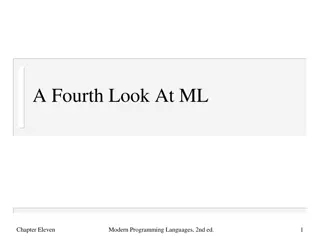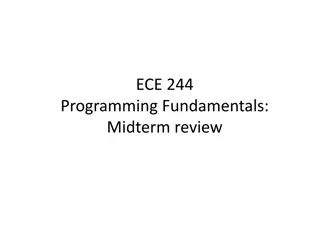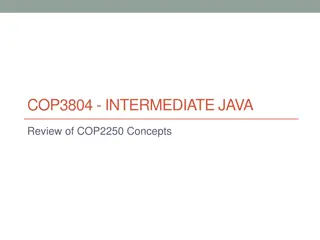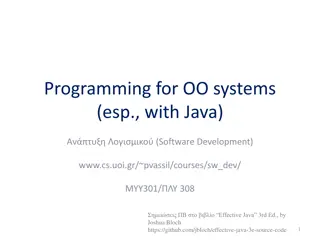Constructors in Java
In Java programming, constructors play a vital role in initializing objects. Constructors eliminate the need for multiple statements to set initial values of instance variables, making the initialization process more efficient. Learn about the basics of constructors, how they are called when objects are created, writing your first constructor, handling multiple constructors in a class, and best practices for utilizing constructors in Java. Explore examples and understand the importance of constructors in object-oriented programming.
Download Presentation

Please find below an Image/Link to download the presentation.
The content on the website is provided AS IS for your information and personal use only. It may not be sold, licensed, or shared on other websites without obtaining consent from the author.If you encounter any issues during the download, it is possible that the publisher has removed the file from their server.
You are allowed to download the files provided on this website for personal or commercial use, subject to the condition that they are used lawfully. All files are the property of their respective owners.
The content on the website is provided AS IS for your information and personal use only. It may not be sold, licensed, or shared on other websites without obtaining consent from the author.
E N D
Presentation Transcript
COMP 110-001 Constructors and Static Methods Yi Hong June 03, 2015
Constructors Recall our Student example: public class Student { private int PID; private int year; . Accessors & mutators .. } Every time we use it, we have to use multiple statements to initialize values of instance variables. Student berkeley = new Student(); berkeley.setPID( 1234 ); berkley.setYear( 2 );
Constructors Isn t this troublesome? What if we have some more complicated initialization steps? (e.g., an instance variable of class type to be initialized) Student berkeley = new Student(); berkeley.setPID(1234); berkley.setYear(2); .
Constructors Constructor is a special method that is called when a new object is created Student berkeley; // not called Student berkeley = new Student(); // called with new keyword
Constructors Let s write our first constructor public class Student { private int PID; private int year; . Accessors & mutators .. There is no return type or void keyword public Student( public Student( int this.PID = PID; this.year = year; } } int PID, PID, int int year ) { year ) { Constructor has the same name as the class }
Constructors public Student( public Student( int this.PID = PID; this.year = year; } } int PID, PID, int int year ) { year ) { With this constructor, we can now do: Student berkeley = new Student( 1234, 2 );
Multiple Constructors You can have multiple constructors in one class They all have the same name, just different parameters public class Student { . public public Student( Student( int this.PID = PID; this.year = year; } } public Student( public Student( int this.PID this.PID = PID; this.year this.year = 1; // default case = 1; // default case the 1 } } } int PID, PID, int int year ) { year ) { int PID ) { PID ) { = PID; the 1st st year year
Constructors Generally, constructor should contain all initialization logic assign initial values based on input parameters assign default initial values without input reserve resource, prepare input/output stream whatever other logic necessary (e.g., error checking ) We will see more examples later.
Default Constructor What if you did not write any constructor? public class Student { private int PID; private int year; . No constructor .. } Java gives each class a default constructor if you did not write any constructor constructor. It assigns a default value to each instance variable. - integer, double: 0 - String and other class-type variables: null - boolean: false Student berkeley = new Student(); if you did not write any
Constructors If you define at least one constructor, a default constructor will not be created for you
Example: Pet class public class Pet { private String name; private int age; private double weight; public Pet() { name = No name yet. ; age = 0; weight = 0; } public Pet(String initName, int initAge, double initWeight) { name = initName; age = initAge; weight = initWeight; } } 11
Calling a Constructor Pet myPet; myPet = new Pet( Lightning , 3, 121.5); You cannot use an existing object to call a constructor: myPet.Pet( Fang , 3, 155.5); // invalid! 12
Calling Methods from Constructors Just like calling methods from methods public Pet(String initName, int initAge, double initWeight) { setPet(initName, initAge, initWeight); } private void setPet(String newName, int newAge, double newWeight) { name = newName; age = newAge; weight = newWeight; } 13
More Complicated Issues Constructor is used to create instance of class Can constructor be private? Can a constructor call another constructor? public Pet(String initName) { this(initName, 0, 0.0); } private Pet(String initName, int initAge, double initWeight) { setPet(initName, initAge, initWeight); }
Static Members static variables and methods belong to a class as a whole, not to an individual object Sounds weird, doesn t it? - static is against OO in some sense Where have we seen static before? When would you want a method that does not need an object to be called?
What about a pow method? // Returns x raised to the yth power, where y >= 0 public int pow(int x, int y) { int result = 1; for (int i = 0; i < y; i++) { result *= x; } return result; } Do we need an object to call this method? 16
static version of pow method public class Math { public static double PI = 3.1415926; // Returns x raised to the yth power, where y >= 0 public static int pow(int x, int y) { int result = 1; for (int i = 0; i < y; i++) { result *= x; } return result; } } static keyword 17
static Static variables and methods can be accessed using the class name itself: System.out.println( Math.PI ); int z = Math.pow(2, 4); 18
Another Example public class MainClass { public static void main(String[] args) { . } } MainClass is the entry-point of one application main method is the entry-point of the class. It is executed before any instance is created. Thus, it has to be static.
static vs non-static All static members are at class level. They are accessed without creating any instance. Thus, there is no current object in writing static methods. static methods has no access to instance variables or non-static methods ( since they belong to instances )
Will This Code Compile? public class SomeClass { public static final double PI = 3.14159; private boolean calculated = false; public static double area(double radius) { calculated = true; return PI * (radius * radius); } } ERROR! Code will not compile static methods are invoked without an object no access to instance variables or non-static methods 21
Will This Code Compile? public class SomeClass { public static final double PI = 3.14159; public int data = 12; private void printData() { System.out.println(data); } public static double area(double radius) { printData(); return PI * (radius * radius); } } ERROR! 22
Will This Code Compile? public class SomeClass { public static final double PI = 3.14159; private void printPi() { System.out.println(PI); System.out.println(area(3.0)); } public static double area(double radius) { return PI * (radius * radius); } } Non-static methods CAN call static methods and access static variables 23
Calling a non-static method from a static method public class SomeClass { public static final double PI = 3.14159; private void printPi() { System.out.println(PI); } public static double area(double radius) { SomeClass sc = new SomeClass(); sc.printPi(); return PI * (radius * radius); } } 24
main is a static method import java.util.*; public class MyClass { public static void main(String[] args) { System.out.println( Give me a number, and I will + tell you its square and its square s square. ); Scanner kb = new Scanner(System.in); int num = kb.nextInt(); int numSquared = num * num; System.out.println( The square is + numSquared); int numSquaredSquared = numSquared * numSquared; System.out.println( The square s square is + numSquaredSquared); } } 25
static Helper Methods import java.util.*; public class MyClass { public static int square(int x) { return x * x; } public static void main(String[] args) { System.out.println( Give me a number, and I will + tell you its square and its square s square. ); Scanner kb = new Scanner(System.in); int num = kb.nextInt(); System.out.println( The square is + square(num)); System.out.println( The square s square is + square(square(num))); } } 26
The Math class Provides many standard mathematical methods, all static Do not create an instance of the Math class to use its methods Call Math class methods using class name Math.abs, Math.max, Math.min, Math.pow, Math.round, and others Predefined constants Math.PI Math.E 27
The Random class Why methods in random are not static? We want a method that returns a random (different) number whenever it is called. Random rand = new Random(); int randNum = rand.nextInt();
Next Class Designing methods and overloading Package & review of classes



